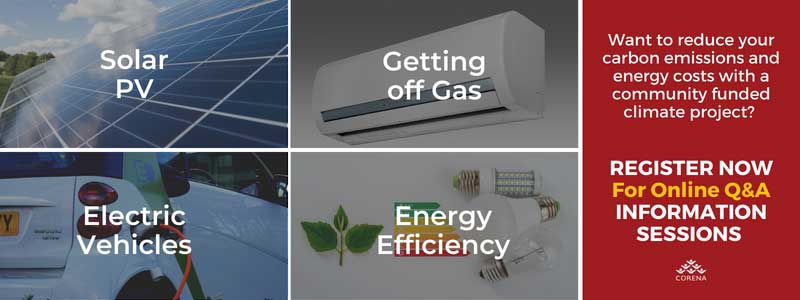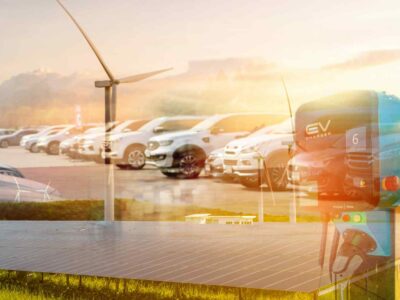Community renewable energy projects are evolving beyond simply generating clean electricity. Across Australia and the globe, innovative initiatives are integrating shared electric vehicles (EVs) and charging infrastructure, powered by renewable sources like solar, into their community energy models. This exciting convergence offers a powerful solution to reduce carbon emissions, lower energy costs, and foster stronger, more connected communities.
The Synergy of Community Energy & Shared EVs
Imagine a community-owned solar farm that not only powers homes but also charges a fleet of electric vehicles available for shared use by all residents. A local community organisation that offers public EV chargers for use by the community or visitors powered by their rooftop solar panels. Electric community buses run by volunteers that offer transport to people unable to drive. A network of local EV owners willing to offer their vehicles to provide power to people in power outages in natural disasters. This vision is becoming a reality, with numerous benefits:
- Reduced reliance on fossil fuels: By powering EVs with solar energy, communities can significantly decrease their dependence on petrol and diesel, slashing greenhouse gas emissions from transportation.
- Lower energy costs: Utilising locally generated solar power for EV charging reduces reliance on the grid and minimises electricity costs for both individuals and the community as a whole.
- Improved air quality: Transitioning to electric vehicles eliminates tailpipe emissions, leading to cleaner air and healthier communities, particularly in urban areas.
- Enhanced mobility: Shared EVs provide accessible and affordable transportation options, especially for those who may not own a car or have limited mobility.
- Increased community engagement: Shared EV programs foster collaboration and a sense of shared ownership, strengthening community bonds.
- Increased resilience in natural disasters: EVs with vehicle to load functionality can provide emergency power in power outages.

Learn more in Emerging Electric Vehicle Types, Technologies & Innovations
Australia Examples
- Hepburn Energy, Victoria, Australia: This pioneering community-owned wind farm is exploring the integration of shared EVs into its energy model, aiming to provide affordable and sustainable transport options for its members. Find out more about our community battery project with Hepburn Energy.
- Byron Shire Respite Service, NSW, Australia: Uses electric vehicles for client transport.
- Geni Energy, NSW, Australia: This community energy organisation is actively involved in promoting EV uptake and supporting the development of charging infrastructure in Narrabri in rural north west NSW.
Learn more in A Guide to Community Energy in Australia: Power to the People
International Inspiration
- Ecovillage at Ithaca, New York, USA: This intentional community features a car-sharing program with EVs charged by a community-owned solar array, showcasing a holistic approach to sustainable living.
- Amsterdam, Netherlands: The Dutch capital has implemented a comprehensive EV sharing program with charging stations powered by renewable energy, contributing to its ambitious sustainability goals.
- Vienna, Austria: A cutting-edge scheme promotes e-mobility through a combination of public and private charging infrastructure, much of it powered by renewable sources.
Learn more in Community Renewable Energy: What It Is & How You Can Get Started
Solar-Powered EV Charging: A Winning Combination
Integrating solar panels with EV charging stations offers a particularly compelling solution. This is an option for both homes and workplaces. Some workplaces already provide free solar-powered EV charging during business hours:
- Direct use of clean energy: Solar panels generate electricity during the day, coinciding with peak EV charging times, enabling direct use of clean energy and minimising reliance on the grid.
- Reduced demand on the grid: By utilising solar power for EV charging, communities can alleviate pressure on the electricity grid, especially during peak demand periods.
- Increased self-sufficiency: Solar-powered EV charging enhances energy independence and resilience, particularly in areas prone to power outages.
Learn more in How To Make The Most Of Your Solar Panels To Charge Electric Vehicles
Environmental, Climate, Social, & Community Benefits
- Environmental: Reduced air pollution, decreased reliance on fossil fuels, protection of natural resources.
- Climate: Lower greenhouse gas emissions, contribution to climate change mitigation efforts.
- Social: Improved public health, enhanced accessibility for those with limited mobility, increased social interaction.
- Community: Stronger community bonds, increased local economic activity, enhanced resilience.
Reducing Emissions & Energy Costs
Community renewable energy projects with shared EVs offer a double win in reducing both carbon emissions and energy costs:
- Emissions Reduction: Switching to EVs powered by renewable energy significantly reduces transportation-related emissions, a major contributor to climate change.
- Energy Cost Reduction: Utilising community-owned solar power for EV charging lowers electricity costs for both individuals and the community.

Learn more in Decarbonisation: Definition, Why It Is Essential & What Non Profits Can Do
The Road Ahead
The integration of shared EVs and charging infrastructure into community renewable energy projects represents a significant step towards a more sustainable and equitable transportation future. By embracing this innovative approach, communities can drive positive change, reduce their environmental impact, and create a cleaner, healthier, and more connected world.
Be Part of Australia’s Community Energy Future
Here at CORENA, we provide an innovative revolving fund model that provides finance to non-profit and community organisations who wish to reduce their carbon footprint and improve their energy efficiency, but cannot afford the upfront expense. Our revolving fund ensures that these kinds of climate projects get the funding that they need in order to get off the ground and become part of the renewable energy transition. Through offering a zero-interest loan, it becomes easy to repay through the savings made on energy bills afforded by the low running costs of a renewable energy project over the long term.
Join Australia’s renewable energy revolution and help to finance projects in your community by donating to our revolving fund. CORENA plays a role in supporting all kinds of community climate and renewable energy projects.
Interest Free Renewable Energy Loans For Non Profits, Community Organisations, Charities, & Social Enterprises
CORENA, can provide free technical advice and zero interest funding to qualifying organisations and communities looking to reduce their emissions and green their energy consumption.
Donations help us to provide funding to non-profit and community organisations for:
- Solar Panels
- Energy Efficiency – such as switching to efficient alternatives or installing insulation
- Getting Off Gas – Replacement of fossil gas appliances with electric alternatives
- Electric Vehicles
- A combination of the above
No interest is paid on CORENA loans, and the quarterly loan repayments are set to be a little less than the savings on operating costs averaged over a year. This means the organisation is never of pocket for upfront costs. After the loan is fully repaid, loan recipients reap the long-term financial benefit of having lower energy costs.
Learn more in 5 Ways CORENA Helps Non Profits Reduce Carbon Emissions & Energy Costs
To learn more, check out how to apply for a loan, or register for one of our upcoming Online Q&A Information Sessions.


